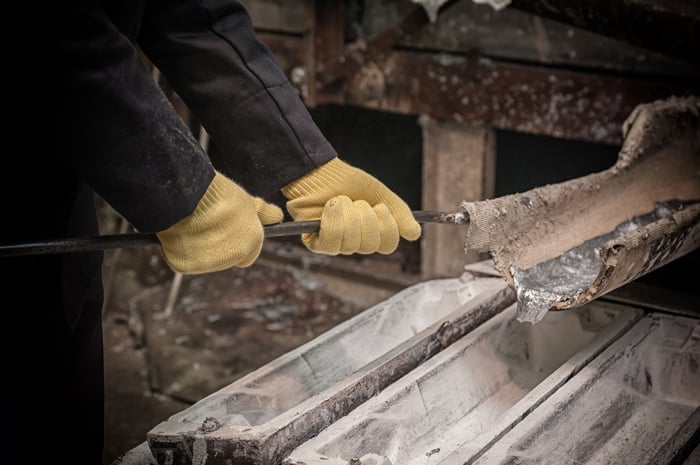At their core, Freeport-McMoRan Inc. (FCX 1.36%) and Alcoa Corp (AA) are reliant on commodity prices to support their top and bottom lines. Freeport's specialty is copper and gold mining, and Alcoa is a vertically integrated aluminum producer. Both have made significant progress in recent years to shift gears and improve the fundamentals underpinning their businesses. However, Alcoa is dealing with fewer distractions, and that makes it a better option today.
Both are getting better
The big story at Alcoa was its late 2016 separation from specialty parts maker Arconic. But leading up to that breakup, Alcoa was working hard to improve its industry position. For example, in 2010 the company was in the second quartile of the cost curve for alumina production and the third quartile for aluminum. Today it's in the middle of the first quartile on the alumina curve and the middle of the second for aluminum. The company got there by closing older, less efficient operations and focusing on improving efficiency.

Image source: Getty Images.
The breakup also left Alcoa with a fairly solid balance sheet. Long-term debt only makes up around 20% of the capital structure, excluding non-controlling interests. In fact, debt is lower by about 3% since the start of 2017. That said, the aluminum maker has material pension obligations, which bring its long-term obligations to around a third of the capital structure -- but that's still a very manageable number.
The story at Freeport is a little different. The copper and gold miner made an ill-timed investment in the oil and natural gas industry. That left it saddled with debt during a commodity downturn. To put a number on that, long-term debt rose from roughly $3.5 billion at the start of 2013 to $20 billion at the end of that same year. But Freeport has been working hard to right the ship, too.
For example, at the end of the third quarter of 2017, long-term debt was down to roughly $12.5 billion -- about a 40% decline from the days after the acquisition. And Freeport has basically sold off most of its energy business, so it's now focused, again, on its core mining operations. That said, long-term debt makes up around two-thirds of the capital structure. In other words, there's still an overhang left from the oil foray that needs watching.
AA Total Long Term Debt (Quarterly) data by YCharts.
So, looking at the overall businesses and the financial foundation provided by their balance sheets, Alcoa appears to be in a better position. But that's just one factor -- there's another issue that Freeport is dealing with.
The lingering cloud
One of Freeport's largest assets is the Grasberg mine in Indonesia. This single mine holds around 30% of its copper reserves and virtually all of its gold reserves, making it a very important part of the miner's portfolio. Unfortunately, Indonesia is looking to get more financial benefit from the mine than it has in the past. That's left Freeport and the Indonesian government locked in tense discussions about the future.
The pair came to a broad agreement about an ownership transition in late August, but the fine details weren't fully worked out. A final deal appears to be nearing, which removes a major headwind. However, Freeport is no longer the majority owner of the mine and its role at Grasberg is time-limited, with operating rights through 2041. This is a strategically important mine. While a final agreement with Indonesia will be a very good thing for Freeport, that 2041 date maintains a wisp of gray on the horizon for the foreseeable future.

Grasberg is a giant mine within Freeport's portfolio. Image source: Freeport-McMoRan Inc.
While every asset (be it a mine or processing facility) has risks associated with it, the Grasberg issue is still a major uncertainty in the background. That question mark coupled with the size of the mine leaves Freeport with a major long-term distraction -- even if the two parties reach an agreement, which hasn't happened just yet.
Alcoa wins this race
While investors are likely to overreact to any hint of improvement at Grasberg, Alcoa still appears better positioned financially. And, over the long-term, the Grasberg solution that's been reached doesn't completely remove the problem; it just kicks the can down the road a bit before issues show up again -- sometime around 2041, if not sooner. I can't say that I would rush out to buy either Alcoa or Freeport today, but if you are looking at this pair of metals companies, Alcoa looks like the better option to me.





